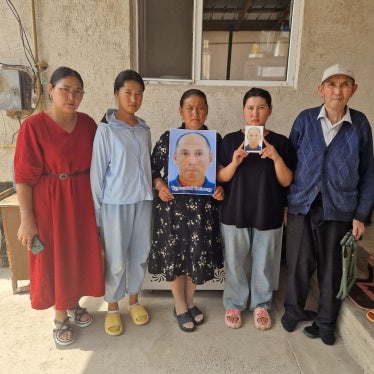All eyes are on President Jacob Zuma's sojourn in Ivory Coast to help lead the AU panel on the post-election crisis.
The incumbent president, Laurent Gbagbo, has refused to respect the internationally recognised election result that his rival, Alassane Ouattara, won the presidency.
Human Rights Watch has reported that forces under Gbagbo's control have been responsible for horrific abuses since the political impasse began in late November.
South Africa's involvement thus far - in mediating the Ivorian conflict - raises profound questions about whose interests it is pursuing: those of an abusive leader clinging to power through targeted killings and a campaign of terror, or those shared by millions of Ivorians living in fear and struggling to survive.
Sadly, the evidence suggests that Pretoria's sympathies are ambiguous at best, and at times publicly lean toward defending Gbagbo.
As Zuma arrives in the country, young men whose names bespeak certain ethnicities, or who wear Muslim dress, are being bludgeoned to death with wooden beams at checkpoints operated by pro-Gbagbo militias working hand-in-hand with security forces. Neighbourhood political leaders in Ouattara's party are being dragged from their homes and mosques in the evening, only to turn up in mortuaries days later; their families describe the bodies as being riddled with bullets.
Young teenage boys have died when elite security forces close to Gbagbo have tossed fragmentation grenades into crowds of peaceful demonstrators. Women have been raped in front of their families and then forced to watch as their husbands are executed, only to be tauntingly told by the perpetrators from the security forces that they should "go tell Ouattara what happened to them".
Human Rights Watch's field research in Abidjan, the country's commercial capital, has shown that security forces and militias under Gbagbo's control have committed widespread extra-judicial killings, forced disappearances, torture, and rape over the past two months. Our in-depth investigation, based on more than 120 interviews with victims and witnesses, revealed an often-organised campaign of violence targeting members of Ouattara's political coalition, Muslims, immigrants from West African countries, and ethnic groups from northern Ivory Coast that tend to support Ouattara.
The UN Office of the High Commissioner for Human Rights reported on February 10 that at least 296 people had been killed and almost 100 more "disappeared" during the post-election violence. Week after week, horrendous abuses are carried out by forces under the ultimate command of Gbagbo and by his proclaimed supporters. An immediate and just solution is needed.
South Africa, however, seems to be undermining international efforts to bring this killing to an end. Just last week, a South African warship was discovered off the coast of West Africa en route to Ivory Coast for reasons that remain unclear. The head of the Economic Community of West African States (Ecowas) described the move as complicating efforts to resolve the crisis. Pretoria has also publicly questioned election results announced by the Ivorian Independent Electoral Commission, certified by the UN, and endorsed by Ecowas, the AU, the European Union, and numerous countries throughout the world.
Ecowas and the AU have sent multiple delegations to try to break the impasse, yet Gbagbo has made it publicly clear that he will accept no resolution other than his continued presidency. Ecowas leaders have indicated a willingness to take further measures to remove Gbagbo, including additional diplomatic measures and even military intervention as a last resort.
South Africa has seemed to thumb its nose at Ecowas's efforts to pressure Gbagbo, however, and has even publicly suggested a power-sharing agreement - with Zuma telling South African journalists that "our view is that we don't demand that one leader should go".
South Africa's president has yet to talk about finding real solutions for ending rights abuses or bringing those responsible for the recent abuses to account.
The EU and US have both instituted sanctions against Gbagbo and many of his closest allies.
Meanwhile, both sides are still armed to the teeth after the 2002-2003 civil war and have raised the spectre of larger-scale human rights abuses should the crisis not be resolved. There are already reports of intensified recruitment of youths by armed forces on both sides of the divide, including recruitment in neighbouring Liberia, threatening to spread the crisis further. There has been no accountability for crimes allegedly committed by any party during the civil war or in its aftermath. That impunity prevails today, and needs to be rectified.
While in the country with the AU panel this week, Zuma should support the African solidarity drive that is trying to end Gbagbo's campaign of violence. As a member of the UN Security Council, Pretoria should advocate strongly for the protection of civilians and of UN peacekeepers in Ivory Coast who face threats incited by those close to Gbagbo.
Zuma should push for justice for the crimes committed.
Without that kind of principled foreign policy, Pretoria will be in the uncomfortable position of having to explain why a democratic state like South Africa is defending Gbagbo's abusive, autocratic regime.
Siphokazi Mthathi: South Africa director of Human Rights Watch.





